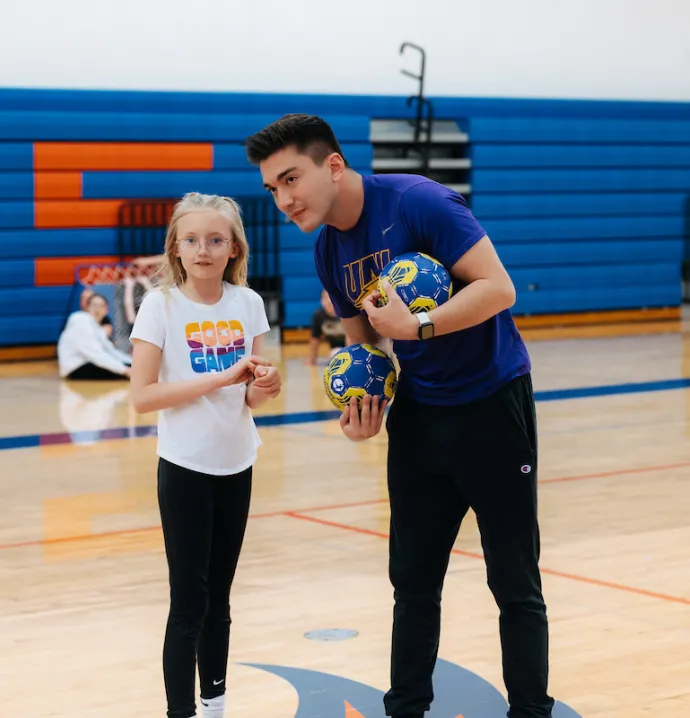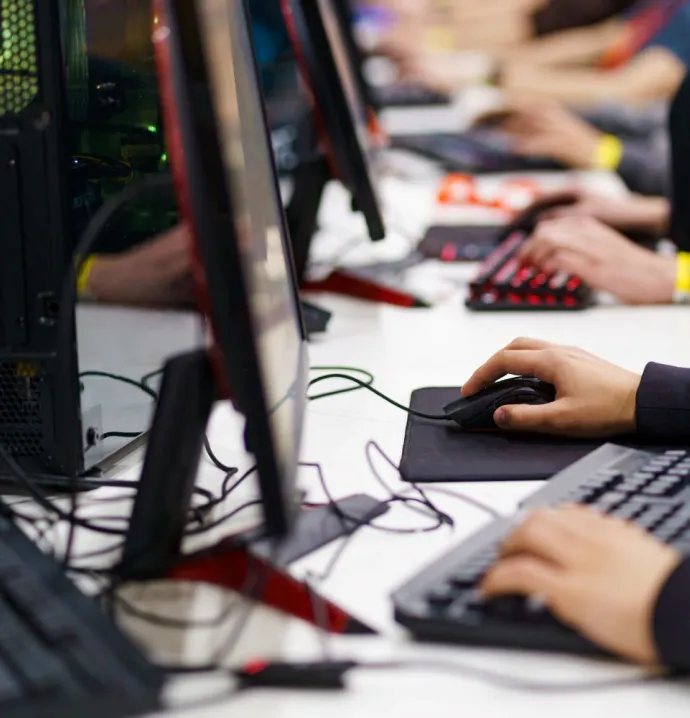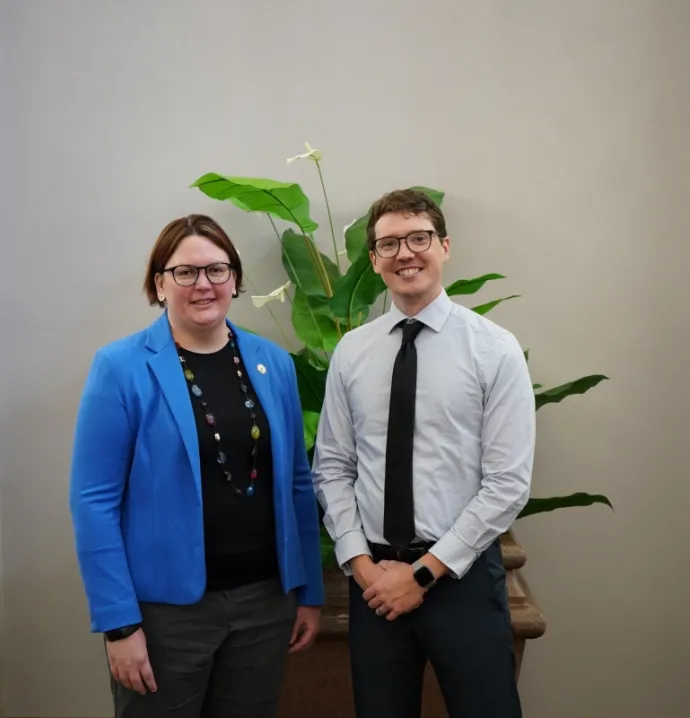‘A system of interconnected institutions’: Racial inequality in schools
‘A system of interconnected institutions’: Racial inequality in schools
UNI Associate Professor of Literacy and Education Shuaib Meacham helps teach future educators how to handle race in the classroom. He also leads a local hip hop literacy program to help connect youth to their love of language, and is helping launch a new project aimed at showcasing Iowa’s diversity. Here, he discusses his work and offers advice for using this unprecedented moment to create lasting change.
What are some examples of racial inequality in teaching and education?
One of the biggest issues I deal with in my class is that kind of mainstream white norm. That gets at the whole level of privilege. If you're white, no one's gonna doubt whether you're qualified to go to college, or whether you deserve to travel the world. That's kind of what white people do. That's a white norm and that's accepted, that's celebrated. But for kids from Waterloo, or kids who don't conform to that white norm — immigrant students, LGBTQIA students who don't fit a certain mainstream pattern or whatever the case may be — they're doubted. They’re seen as dangerous; they're seen as problematic. Then their academic output or productivity is questioned because it may not conform in various ways to that mainstream norm that's accepted.
So, you have kids who are coming into the classroom with a range of different issues and challenges, and you've been taught to focus on teaching English. And you just go in under the assumption that the kids are going to follow you your lesson plan, and if they don't follow it, what happens is that kid gets labeled — ’That's a bad kid, they don't care about education, their parents don't care about education.’ But … students do have interests and passions as it relates to literacy, reading and writing. You just have to recognize what those are and connect what you're doing in the classroom to those interests and passions. And I think [that’s] my challenge and what I try to address in my classroom.
What are some of the causes of these issues?
Black people are portrayed and perceived as more dangerous. You see a Tamir Rice, who's a 12 year old with a toy gun and he gets perceived as so dangerous, he gets shot and killed. So black youth and black childhood, that concept is at risk. Because we're perceived as older, as bigger, larger and more threatening — and so all these things that happen in the larger part of society then get taken into the school building. So you see the disproportionate incarceration rates. We’re less than 10% of the population, but we're over 30% of the prison population. By the same token, you look at school discipline — we’re a relatively small part of the school population, but … there's a tremendous disproportionality of black youth being in special education, of being suspended. Some of the same things that are happening in the streets of America with the police are happening in the schools with the teachers and administrators. So that's where you get to the systemic element of this. This is a system of interconnected institutions and perceptions and values.
What can the issues in education surrounding race teach us about institutionalized racism as a whole? How are the issues in education connected to these larger issues?
When you think about being in the year 2020 and not having a college education and the challenges that creates, it’s little wonder that you have these kinds of disparities. I mean, it's hard enough if you have a college education, let alone if you have large segments of your population without one. Often a symptom of not having a college education is having no sense of purpose after you leave school. If you don't have a sense of purpose and you're an adult and you have this lower paying job, you're more likely to be in economic difficulties that you might be more tempted to solve through illegal means, which brings you into unwanted contact with police. Police are profiling and already seeing you as a problem. And you might have had a suspension record in school, and that will lead to you probably serving time at some point. So, you start to see how these systems interconnect. When you have teachers who aren't prepared to recognize and acknowledge that range of issues they are walking into when they walk into the school building as teaching professionals … it’s just a recipe for the kinds of challenges we are facing right now.
What’s one way you’re working to address inequality in our schools?
I have a program called Hip Hop Literacy that works with elementary through high school students in Waterloo and helps them use their passion for hip hop to be aware and acquire professionally relevant skills. In education, with these larger issues, they’ve got a structure where you have a white norm and that’s based on test scores. So because students often don’t measure up to white students in terms of this standardized test score, they emphasize this achievement gap, and you’ll see black students have this literacy deficit. But I was in Denver, Colorado for a period of time, and they had a poetry open mic at this cultural center. You’d have these young black and Latinx students who would show up at the open mic, and they were there simply because of their love of language communication. These young people have a passion for literacy. So for the past seven years, I've been working with kids and Waterloo to really take advantage of their passion for hip hop and use that to help them become aware of their kind of literary abilities and their literacy skills. So, we use the learning culture of hip hop to just increase the learning of the kids in the schools, and it's been extremely successful.
How do you feel about the current protests surrounding the murder of George Floyd? Do you think the large-scale protests are a sign of real change?
George Floyd, I think he just represents a tipping point. Eric Garner already said ‘I can't breathe’ about six years ago when he was choked out in New York City. Black men and women being murdered for pretty much no reason by the police has been happening. Eventually, they are not going to be people in the streets protesting. Eventually, coronavirus is going to be less of an issue and some of the things that have worked together to produce this moment are not going to be present. That's when "Is this real?" can be effectively answered. It happens pretty regularly that there'll be things that occur and it might capture and penetrate the consciousness of people for a moment. But then the new cycle shifts and the momentum is gone. This has to be an ongoing commitment and not something that's just reacting to a particular moment. But there is an opportunity, there are some possibilities and finding ways to creatively keep people's consciousness aware of the need for ongoing pressure to address these issues is the critical factor.
Do you have any advice for how we can use this moment to create lasting change?
One of my favorite phrases from this is, “You shouldn't waste the opportunity of a good crisis.” This crisis represents an opportunity to rethink and recalibrate such that we empower … those people who have been telling us that things need to change. It’s recognizing who those people are. These circumstances and these challenges, while it may have sparked our consciousness or the consciousness of people in authority at this moment, for others, it's been ongoing. And so those people have to be identified and then placed in a position of greater authority so they can carry out that role of accountability they've been attempting to carry out for a long time. There are people who are truly dedicated to these issues, and if they can be empowered and the work that they do could be supported ... that kind of work can be used strategically to benefit the entire campus.




